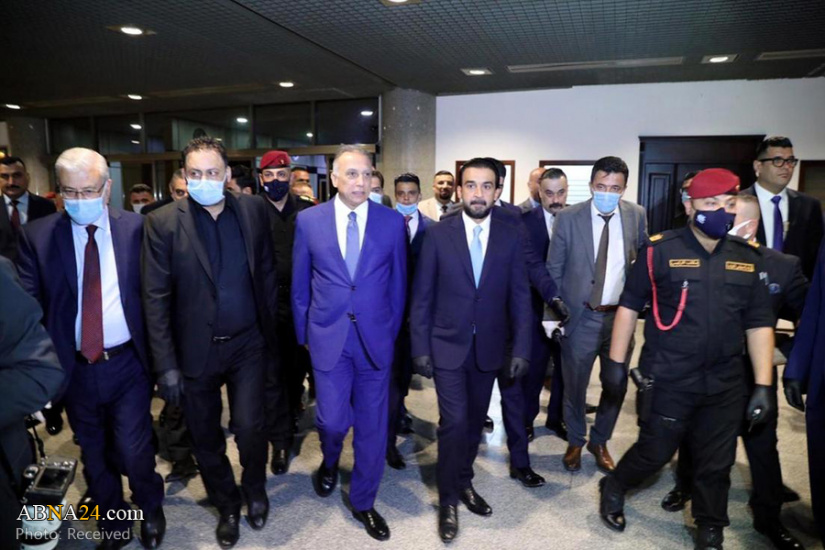The Rough Road ahead of Mustafa Al-Kadhimi

Amid the Coronovirus pandemic and the nosedive that oil price has taken, so much so that the government may not be able to pay the May salary of the civil servants, Iraq is still struggling over the vote of confidence to its new prime minister.
Mustafa Al-Kadhimi, previously the director of Iraqi National Intelligence Service, has been bargaining with political parties for three weeks to secure the vote of confidence for his cabinet, and ideally strike a consensus in the Iraqi parliament. Pondering over a vote to Al-Kadhimi's cabinet, political parties are on the one hand well aware that this may be the last chance to choose a prime minister with consensus, as Al-Kadhimi is backed by the majority of Iraqi protesters, Sunni groups in the parliament, the religious authorities in Najaf, Kurds, and several Shia groups in the parliament, and that after four unsuccessful bids by candidates, rejection of Al-Kadhimi may refuel the anger of the public opinion and led Iraq into another round of chaos. In the meantime, they are uneasy with the reality that Al-Kadhimi seeks formation of a supra-partisan cabinet whose members are handpicked by himself, unlike the previous cabinets which were the result of intensive negotiations between the PMs and political parties. [tbd] [tbd] This has not stopped two political parties led by former prime ministers, Nuri Maliki from the State of Law coalition, and Ayad Allawi from Al-Wataniya, have decided to boycott the vote of confidence session of the parliament, embracing the risk it may include in Iraq's current dire political and economic situation. The demonstrations held last Sunday and Monday in Wasit, eastern Iraq, despite the Corona curfew, against political parties who meddle in formation of the cabinet, is an indicator of the current mood in Iraq.
At the moment, there is consensus over appointment of Al-Kadhimi as the next PM, and chances of his rejection by the parliament are low, particularly due to pressures by foreign powers for quick formation of the Iraqi cabinet. However, this does not mean that after securing the vote of confidence, Kadhimi can start an easy task in the prime minister's office. The sad saga of Adil Abdul-Mahdi administration showed even if more efficient than its predecessors, a cabinet may still fall victim to public fury and sabotage by political rivals.
If he succeeds in securing a vote of confidence on Wednesday night, Al-Kadhimi will wake on Thursday morning with a myriad of challenges: oil price downfall and a 23 percent cut in Iraq's oil production following the latest OPEC+ agreement, Coronavirus pandemic - which has battered Iraq's already frail economy, the stalemate over 2020 national budget and the tussle between the central government and Kurdistan Regional Government -and to a lesser extent, Basra, the ongoing fight between political parties and the government over appointments at various levels -from deputy ministers to ambassadors, the spectre of Daesh, the infighting in Popular Mobilization Forces and Washington's pressures on the government to contain the paramilitary group, the Trump administration's ceaseless pestering of Baghdad to wind down relations with Tehran despite Iraq's need to have direct, continuous relations with its neighbor, the parliamentary bill calling for US' troops withdrawal from Iraq -which Washington sees detrimental to bilateral relations, and preparations for the 2021 presidential election. Time may also be against Al-Kadhimi: scorching summer and its power blackouts is a traditional season for demonstrations against the government. The return of Daesh and demolition of power stations, compounded by Washington's pressures on Iraq to cut back electricity import from Iran, will be other challenges to Al-Kadhimi.
Many believe that rising insecurities in Iraq have necessitated that a security figure be at the helm of the country, but not everything should be viewed through the security prism which makes negotiations and bargaining a tough job. Al-Kadhimi's supporters believe he is the right man for Iraq's current chaotic state: he's security background does not extend four or five years, and is overshadowed by his cultural background as a journalist.
* Ali Mousavi Khalkhali is editor in chief of Iranian Diplomacy

